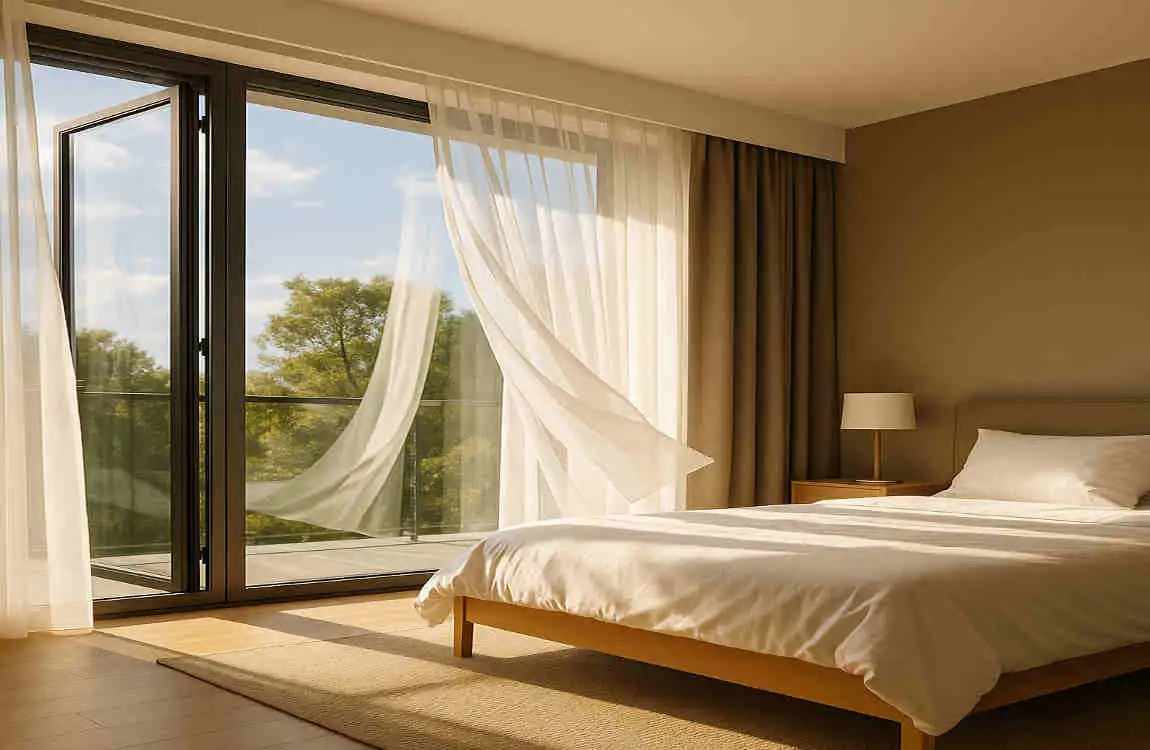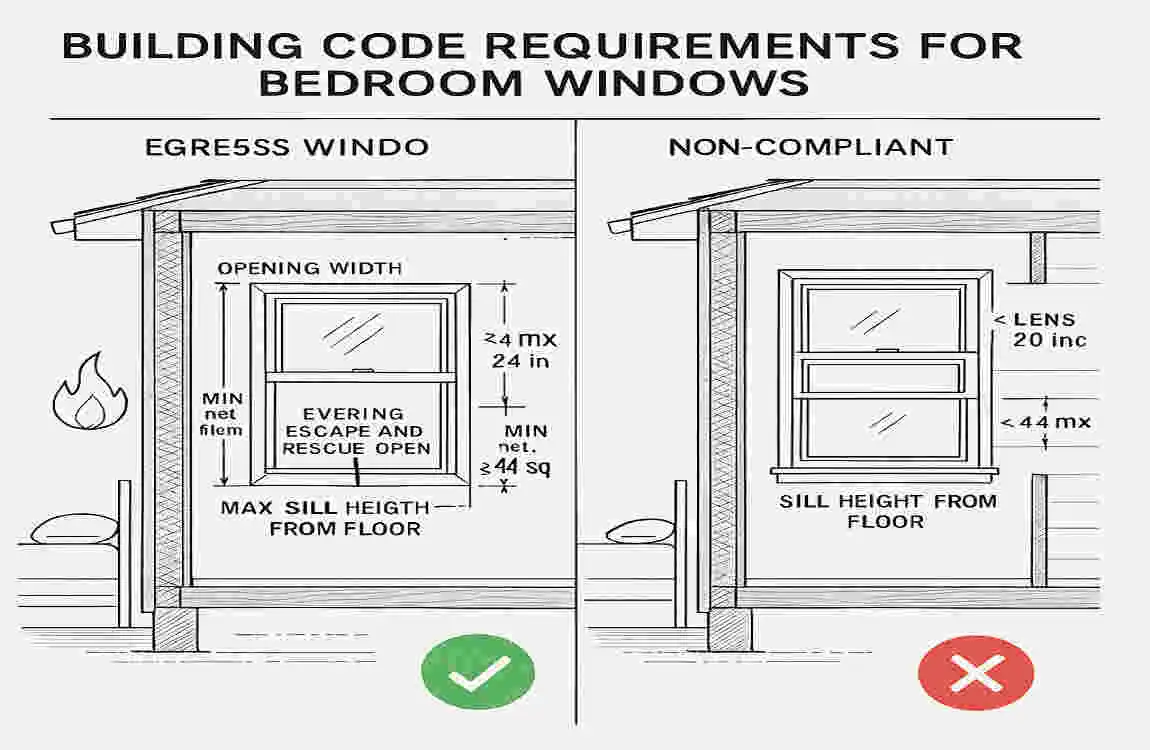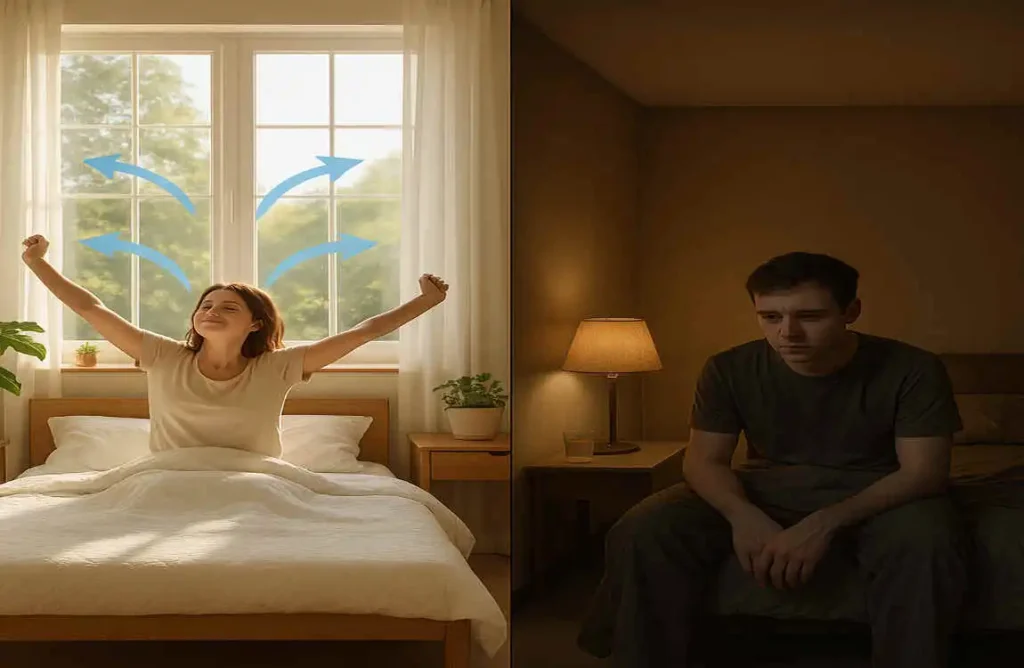When designing a bedroom, one question often arises: Does a bedroom need a window? While it may seem like a simple yes-or-no answer, the truth is that windows play a crucial role in creating a healthy, comfortable sleeping environment.
The Importance of Windows in Bedrooms

Why Does a Bedroom Need a Window for Natural Elements?
Let’s start by looking at the basic functions of windows in a bedroom. At their core, windows serve two primary purposes: letting in natural light and providing ventilation. These two elements are essential for creating a comfortable and healthy sleeping environment.
The Role of Windows for Natural Light
Natural light is crucial for regulating our circadian rhythms, which help us fall asleep and wake up at the correct times. When we’re exposed to natural light during the day, our bodies produce less melatonin, the hormone that makes us feel sleepy. As the sun sets and the light dims, our melatonin levels increase, signaling to our bodies that it’s time to rest.
Studies have shown that exposure to natural light during the day can improve sleep quality and duration at night. In fact, one study found that people who had access to natural light in their bedrooms slept an average of 46 minutes longer than those who didn’t.
How Windows Contribute to Natural Ventilation and Air Quality
In addition to letting in natural light, windows also play a crucial role in providing ventilation and improving air quality in bedrooms. When we open our windows, we allow fresh air to circulate, helping remove stale air, odors, and pollutants from our sleeping environment.
Good ventilation is essential for maintaining healthy indoor air quality. Without it, we may be exposed to higher levels of allergens, mold, and other irritants that can affect our respiratory health and overall well-being. By regularly opening our windows, we can reduce the risk of these health issues and create a more comfortable sleeping environment.
Health Benefits of Natural Light in Bedrooms
Regulating Circadian Rhythms and Improving Sleep Quality
As we mentioned earlier, natural light plays a crucial role in regulating our circadian rhythms and improving sleep quality. When we’re exposed to natural light during the day, our bodies produce less melatonin, which helps us feel more alert and awake. As the sun sets and the light dims, our melatonin levels increase, signaling to our bodies that it’s time to rest.
Studies have shown that people who have access to natural light in their bedrooms tend to have better sleep quality and duration. In fact, one study found that people who slept in rooms with windows facing east or south (which receive more natural light) slept an average of 30 minutes longer than those who slept in rooms with windows facing north or west.
Mental Health Benefits: Reducing Depression and Anxiety
In addition to improving sleep quality, natural light has also been shown to have mental health benefits. Studies have found that exposure to natural light can help reduce symptoms of depression and anxiety, and improve overall mood and well-being.
One study found that people who had access to natural light in their workplaces reported lower levels of depression and anxiety than those who worked in windowless environments. Another study found that exposure to natural light can help reduce symptoms of seasonal affective disorder (SAD), a type of depression that’s related to changes in seasons.
Promoting Production of Vitamin D
Another significant benefit of natural light is that it helps our bodies produce vitamin D. Vitamin D is essential for maintaining healthy bones, muscles, and immune systems, and it’s also been linked to improved mental health and well-being.
When we’re exposed to natural light, our skin absorbs ultraviolet B (UVB) rays, which trigger the production of vitamin D. Without access to natural light, we may be at risk of vitamin D deficiency, which can lead to a range of health issues, including weakened bones, muscle weakness, and increased risk of depression.
Importance of Ventilation for Comfort and Well-being
The Role of Windows in Providing Ventilation and Air Circulation
As we mentioned earlier, windows play a crucial role in providing ventilation and improving air quality in modern bedrooms. When we open our windows, we allow fresh air to circulate, helping remove stale air, odors, and pollutants from our sleeping environment.
Good ventilation is essential for maintaining a comfortable and healthy sleeping environment. Without it, we may be exposed to higher levels of allergens, mold, and other irritants that can affect our respiratory health and overall well-being. By regularly opening our windows, we can reduce the risk of these health issues and create a more comfortable sleeping environment.
Health Risks Related to Poor Ventilation
Poor ventilation can lead to a range of health issues, including respiratory problems, allergies, and even mold growth. When we don’t have access to fresh air, we may be exposed to higher levels of pollutants and irritants, which can affect our health and well-being.
Mold, in particular, can be a significant problem in poorly ventilated bedrooms. When moisture is trapped in a room without proper ventilation, it can create the perfect environment for mold to grow. Mold can trigger allergies, asthma, and other respiratory issues, and it can also affect the structural integrity of our homes.
How Fresh Air Improves Respiratory Health and Cognitive Function
On the other hand, good ventilation can have a range of health benefits. When we have access to fresh air, we may experience improved respiratory health, reduced allergy symptoms, and even better cognitive function.
Studies have shown that exposure to fresh air can improve lung function and reduce the risk of respiratory conditions such as asthma and bronchitis. Fresh air can also help reduce levels of pollutants and irritants in our sleeping environment, improving overall air quality and reducing the risk of health issues.
In addition to its physical health benefits, fresh air has also been shown to improve cognitive function. Studies have found that exposure to fresh air can help improve concentration, memory, and overall mental performance. By opening our windows and letting in fresh air, we can improve our physical and psychological well-being.
Tips for Maximizing Natural Ventilation
If you’re lucky enough to have windows in your bedroom, there are a few things you can do to maximize natural ventilation and improve air quality:
- Open your windows regularly to allow fresh air to circulate.
- Use fans to help circulate air and improve ventilation.
- Keep your bedroom clean and free of dust and other allergens.
- Consider using an air purifier to help remove pollutants and improve air quality.
By following these tips, you can help create a more comfortable, healthier sleeping environment and enjoy the benefits of good ventilation.
Building Code and Legal Requirements Regarding Bedroom Windows

Common Building Regulations
When designing a bedroom, there are often building codes and legal requirements that must be followed. One of the most common requirements is that bedrooms must have windows or some other means of egress in case of an emergency.
These regulations are in place to ensure the safety of occupants in the event of a fire or other emergency. Windows provide a way for people to escape a burning building and allow firefighters to access the room from the outside.
Fire Safety Requirements and Emergency Escape Rules
In addition to providing a means of egress, windows in bedrooms must also meet specific fire safety requirements. For example, windows must be large enough to allow a person to escape through them and be positioned at a height that’s easily accessible.
In the United States, the International Residential Code (IRC) requires that bedroom windows have a minimum net clear opening of 5.7 square feet, with a minimum height of 24 inches and a minimum width of 20 inches. The window sill height must also be no more than 44 inches above the floor.
Exceptions and Allowances in Modern Architectural Design
While most building codes require bedrooms to have windows, there are some exceptions and allowances in modern architectural design. For example, some basement bedrooms may not have windows due to their location below ground level.
In these cases, alternative means of egress must be provided, such as an egress door or a window well with a ladder. These alternatives must meet the exact safety requirements as traditional windows and be approved by local building authorities.
Importance of Compliance for Safety and Insurance Purposes
It’s essential to comply with building codes and legal requirements when designing a bedroom, not just for safety reasons, but also for insurance purposes. If a bedroom doesn’t meet the required standards, it may not be considered a legal bedroom, which can affect your home’s value and your ability to obtain insurance.
By following building codes and legal requirements, you can help ensure the safety of your home and its occupants, and avoid any potential issues with insurance or resale value.
Design and Practical Considerations for Bedrooms Without Windows
Alternative Solutions When a Window is Not Possible
While windows are ideal for providing natural light and ventilation in bedrooms, there may be situations where a window is not possible. In these cases, there are alternative solutions that can help create a comfortable and healthy sleeping environment.
One option is to use mechanical ventilation systems, such as exhaust fans or heat recovery ventilators, to improve air quality and circulation. These systems can help remove stale air and bring in fresh air from outside, even when a window is not present.
Another option is to use artificial lighting to simulate natural light. There are a variety of lighting options available, from LED lights to full-spectrum bulbs, that can help create a bright and inviting sleeping environment.
Pros and Cons of Windowless Bedrooms
While there are alternative solutions, there are still pros and cons to consider when it comes to windowless bedrooms.
On the one hand, windowless bedrooms can offer more privacy and security, as there’s no need to worry about prying eyes or potential intruders. They can also be more energy-efficient, as there’s no need to heat or cool the room through a window.
On the other hand, windowless bedrooms can feel more claustrophobic and confining, as there’s no access to natural light or views of the outside world. They may also be more prone to poor air quality and ventilation issues, which can affect health and well-being.
Technologies and Methods to Simulate Natural Light and Airflow
If you’re considering a windowless bedroom, there are a variety of technologies and methods available to help simulate natural light and airflow.
One option is to use full-spectrum lighting, which mimics the color and intensity of natural sunlight. These lights can help regulate circadian rhythms and improve sleep quality, even in the absence of a window.
Another option is to use air purifiers and ventilation systems to improve air quality and circulation. These systems can help remove pollutants and allergens from the air and bring in fresh air from outside, even when a window is not present.
Advice on Improving Indoor Air Quality
If you do decide to go with a windowless bedroom, there are a few things you can do to improve indoor air quality and create a more comfortable sleeping environment:
- Use an air purifier to help remove pollutants and allergens from the air.
- Keep your bedroom clean and free of dust and other irritants.
- Use a dehumidifier to help control moisture levels and prevent mold growth.
- Consider using plants to help purify the air and add a touch of nature to your sleeping environment.
By following these tips, you can help create a more comfortable, healthier sleeping environment, even without a window.
Psychological and Emotional Impact of Having or Lacking a Bedroom Window
Connection Between Access to Daylight/Views and Emotional Well-being
In addition to the physical health benefits of natural light and ventilation, there’s also a strong connection between access to daylight and views and emotional well-being. When we have access to natural light and views of the outside world, we tend to feel more connected to nature and more in tune with our surroundings.
Studies have shown that exposure to natural light can help reduce symptoms of depression and anxiety and improve overall mood and well-being. One study found that people with access to natural light in their workplaces reported lower stress and higher job satisfaction than those working in windowless environments.
Feeling of Confinement or Stress in Windowless Bedrooms
On the other hand, windowless bedrooms can sometimes lead to feelings of confinement or stress. When we don’t have access to natural light or views of the outside world, we may feel more isolated and disconnected from our surroundings.
This can be especially true for people who spend a lot of time in their bedrooms, such as those who work from home or have mobility issues. Without access to natural light and views, these individuals may be at greater risk of feeling confined or stressed.
Ways to Compensate Psychologically if a Bedroom Lacks Windows
If you do find yourself in a windowless bedroom, there are a few things you can do to compensate psychologically and create a more comfortable and inviting sleeping environment.
One option is to use plants and other natural elements to bring a touch of nature into your bedroom. Studies have shown that exposure to nature can help reduce stress and improve mood, so adding a few plants or a small indoor garden can make a big difference.
Another option is to use color and lighting to create a more inviting and relaxing atmosphere. Soft, warm colors and gentle, diffused lighting can make a calming, soothing environment, even in the absence of natural light.
Finally, consider adding some personal touches to your bedroom, such as photos, artwork, or other meaningful objects. These items help create a sense of connection and comfort, and make your bedroom feel more like a personal sanctuary.
